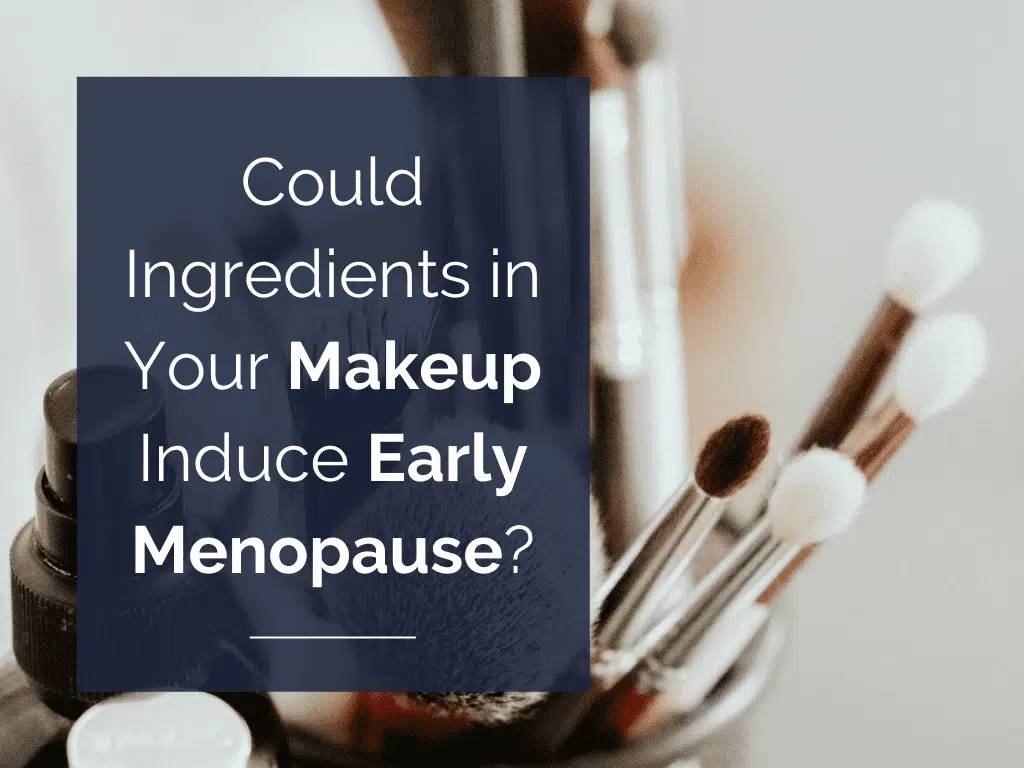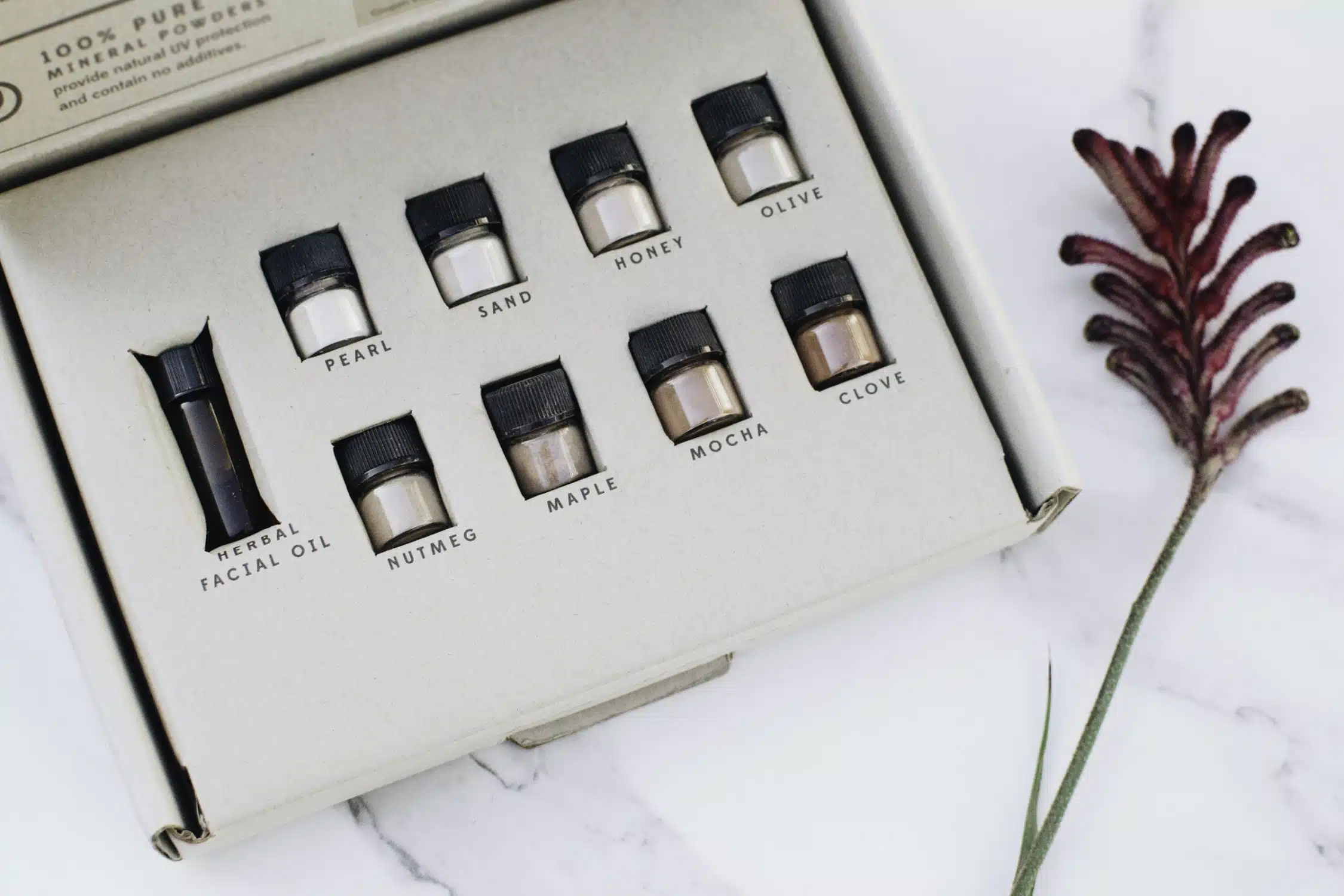
Today’s guest post is from our friends at Annmarie Skin Care. It will make you think about the cosmetics you’re using and whether you need to make a change.
For a lot of us, makeup goes on first thing in the morning and often doesn’t come off until our workday is done. This means we’re spending a lot of time wearing it. It’s alarming to think that something we use so often could have side effects that we’re unaware of.
Is it possible that something as seemingly harmless as makeup could have an effect as dramatic as ushering in an early menopause? Sounds impossible, right?
Maybe not, according to a recent study from researchers at Washington University School of Medicine in St. Louis. Turns out that women with high levels of certain chemicals in their bodies—some of which can come from makeup—experience menopause two to four years earlier than women with lower levels of these chemicals in their systems.
Is it really the makeup? If so, what can we do, besides go barefaced?
Study Finds Link Between Chemicals in the Blood and Early Menopause
For the study, researchers used data from the National Health and Nutrition Examination Survey (NHANES) on about 31,000 women, gathered between 1999 and 2008. These women had undergone blood and urine tests. Researchers examined the tests for about 110 chemicals suspected of interfering with hormones in the body (endocrine disruptors).
Some of these chemicals included the following:
- Dioxins: Chemical byproducts that are known animal carcinogens. Over 50 cosmetic ingredients may be contaminated with this chemical, including sodium myreth sulfate, PEG, oxynol, ceteareth, oleth, polyethylene, and more.
- Phthalates: Chemicals used to make plastics and as solvents. Found in cosmetic products like nail polish, hairsprays, makeup, lotions, liquid soaps, and perfumes.
- Polychlorinated biphenyls (PCBs): Industrial chemicals used in coolants, insulating materials, and lubricants.
- Phenols and phenolic derivatives: Man-made chemicals produced from petroleum and used in making plastics and related materials. Found in dental sealants, sunscreen, lotions, hand soap, and toothpaste.
- Organophosphate pesticides: Common insecticides used in farming and agriculture.
- Surfactants: Chemical cleansing agents. Found in cleansers, body washes, liquid soaps, and more.
- Polycyclic aromatic hydrocarbons (PAHs): A group of over 100 chemicals formed during the incomplete burning of coal, oil, gas, garbage, tobacco, and even charbroiled meat. Also man-made to make dyes, plastics, and pesticides. Present in some shampoos and hair dyes.
The researchers focused most on chemicals known to be hormone disruptors—those that can interfere with how estrogen, the female hormone, functions in the body. Their results showed:
- Women with high levels of certain hormone-disrupting chemicals experienced menopause about 2 to 4 years earlier than women with low levels of these chemicals.
- Women with high exposures to endocrine-disrupting chemicals (EDCs) were up to 6 times more likely to be menopausal than those with low levels.
- Researchers identified 15 EDCs “that warrant closer evaluation” because of their potentially detrimental effects on ovarian function. These included PCBs, pesticides, phthalates, and furan (a toxic chemical used in chemical manufacturing industries and found in low levels in some canned or jarred foods).
Though this study doesn’t prove that using personal care products is going to lead to early menopause, it does show that chemicals we’re all exposed to on a daily basis can have negative effects on hormonal health.
Early Menopause Isn’t Just Inconvenient
Early menopause is more than just an inconvenience. It’s actually a health condition called “primary ovarian insufficiency.”
When premature menopause does occur, it can put women at risk for other health problems, including the following:
- Heart disease
- Osteoporosis
- Neurological diseases
- Cerebral aneurysms
- Depression, anxiety, and mood changes
- Negative body image
- Dyspareunia (painful intercourse)
We already know that conditions like thyroid disease, rheumatoid arthritis, lupus, medical treatments, infections, epilepsy, and Addison’s disease, can cause early menopause. Now we’re discovering that chemicals like those listed above may also affect the ovaries, decreasing activity and causing a drop in estrogen that leads to menopause.
Other Evidence of Chemical-Induced Early Menopause
It’s not such a great leap to imagine that chemicals in our cosmetics and in our environment could have an effect on menopause. A number of other studies have already suggested this possibility.
One of the biggest concerns are plasticizers—chemicals like BPA and phthalates. They have been linked to an increased risk of diabetes, asthma, and other health issues, and have been found to affect hormones in humans.
The bad news is that according to the Centers for Disease Control and Prevention (CDC), there is “widespread” exposure to these chemicals in the American population. In addition, adult women have higher levels of phthalates than men—phthalates that are used in soaps, body washes, shampoos, cosmetics, and similar personal care products.
- A 2012 study found that BPA and phthalates may be linked to lower thyroid levels. At high levels of exposure, the chemicals could reduce thyroid hormones by 10 percent.
- A 2013 study found that BPA may have a direct effect on fertility in women, and may affect the maturation of the egg. Researchers also noted that BPA could affect chromosomes, potentially increasing the risk of birth defects.
- In 2011, researchers reported that chemicals in common household products like non-stick pans, clothing, furniture, carpets, and paints were associated with early menopause. The specific chemicals were perfluorocarbons (PFCs), chemicals linked to cancer and thyroid disease in animal studies.
- The National Institute of Environmental Health Sciences states that endocrine disruptors may interfere with the body’s hormonal systems, potentially increasing the risk of fertility problems, some cancers, and causing developmental, reproductive, neurological, and immune effects in people and wildlife. These chemicals, they note, include dioxins, pesticides, plasticizers (like BPA and phthalates), and polychlorinated biphenyls. All can be found in plastic bottles, metal food cans, detergents, flame-retardants, food, toys, cosmetics, and pesticides.
Though some of these chemicals are beyond our control—they’re present in the soil, water, and air—many are in the skin and makeup products we use every day. That means that by being selective about what we put on our skin, we can reduce our exposure and hopefully the risks associated with it.
The special offer for Hormones Balance Readers
Annmarie and her team have put together a special offer for us — so you can try a nontoxic makeup:
Mineral Multi-Purpose Foundation.
Brush it on like a powder or mix it with your moisturizer to create a beautiful, liquid foundation.
Are you concerned about toxins and early menopause? Do you have tips for reducing exposure? Please share them with our readers.
Sources:
Natalia M. Grindler, et al., “Persistent Organic Pollutants and Early Menopause in Women,” PLoS One, January 28, 2015, doi: 10.1371/journal.pone.0116057,http://journals.plos.org/plosone/article?id=10.1371/journal.pone.0116057.
Diane Duke Williams, “Earlier menopause liked to everyday chemical exposures,” Washington University in St. Louis, January 28, 2015,https://news.wustl.edu/news/Pages/menopause-chemicals.aspx.
Jane Muncke, et al., “Food packaging and migration of food contact materials: will epidemiologists rise to the neotoxic challenge?” J Epidemiol Community Health, doi: 10.1136/jech-2013-202593,http://jech.bmj.com/content/early/2014/01/28/jech-2013-202593.
Andrew McDougall, “Study links early menopause to everyday exposure—but NOT cosmetics!” Cosmetics Design, January 30, 2015,http://www.cosmeticsdesign-europe.com/Formulation-Science/Study-links-early-menopause-to-everyday-exposure-but-NOT-cosmetics.
John D. Meeker, Kelly K. Ferguson, “Relationship between Urinary Phthalate and Bisphenol-A Concentrations and Serum Thyroid Measures in U.S. Adults and Adolescents from the National Health and Nutrition Examination Survey (NHANES) 2007-2008,” Environ Health Perspect. July 2011; 119:1396-1402;http://ehp.niehs.nih.gov/1103582/.
Ronit Machtinger, et al., “Bisphenol-A and human oocyte maturation in vitro,” Human Reproduction, July 30, 2013; 28(10):2735-2745,http://humrep.oxfordjournals.org/content/28/10/2735.
Ben Forer and Suzan Clarke, “Study: Chemical in Many Household Products Associated with Early Menopause,” ABC News, March 25, 2011,http://abcnews.go.com/Health/study-chemical-household-products-early-menopause/story?id=13212353.

I love your page! I started my chemical-free journey last year with cleaning and personal care products. I loved them so much I joined the company! I enjoy sharing tips I’ve learned with other people, and I love learning more. Thank you for sharing your knowledge with us!
HI Camille,
Thank you for sharing with others. We need more people out there like you.
Angela HB Team
What chemical free products do you use for you body? Face creams, lotions, shampoo and conditioners? I don’t wear make up tho. Just needing chemical free body products.
Thank you
I am just finishing up an ebook on this! Crazy what is hiding in skincare.
Hi Victoria,
I’m glad you learned how those chemicals are hiding in skincare products. Now you can be a smarter shopper.
Angela HB Team
I wash my face with organic virgin olive oil, sometimes spray it with colloidal silver; and then I use some aloe vera gel (let dry) and then a bit of coconut oil and a couple of drops of “cold pressed” castor oil (not the kind in the pharmacy as it is processed with chemicals) mixed together with my fingers for my day and night skin cream…result is beautiful soft skin and young at 65. I have never used foundation make-up as they has never been a need to.
Hi Carolyn,
Thank you for sharing some of your beauty secrets. Nice to see you are going all natural! Beautiful.
Angela HB Team
Thanks for sharing. That sounds like a winner.
I use Anne Marie products as well and they’re the best! I actually love all her products.
Me too! -Taylor, HB Team
[…] How do we get exposed to these chemicals? It’s largely through the products we choose to use in our homes (like plastics and cleaners) and on our bodies (like skin and hair care products). I’ve written more about some of these compounds and how to avoid them in What’s hiding in your laundry soap?, Top 10 Toxic Skin Care Ingredients that Impact Hormonal Health, and Could Ingredients in Your Makeup Induce Early Menopause? […]
[…] processes and used in consumer products can contribute to estrogen dominance and even lead to early menopause. Here are some of the problematic and hormone-disrupting chemicals found in the vast majority of […]
[…] Parfum is simply a term for added fragrance and can hide hundreds of synthetic chemicals, including phthalates. Phthalates are hormone-disrupting chemicals that are linked to low thyroid, fertility problems, certain cancers, and more. They can even ultimately lead to early menopause. […]
Do you have any advice for treating POI? The NIH study reveals best treatment requires long term physiologic HRT to replace the hormones we should have in our 20s 30s etc. Do you think there is a safe way to do this that doesn’t increase cancer risk? Not taking HRT would leave all those serious heart and brain health risks you listed above on the table. In my search I haven’t been able to find much info from natural health pracritioners about treating POI since its so rare.
The reality is that many makeup products contain a very toxic component. This not only spoils the condition of our skin, but can also lead to very sad consequences. I sincerely advise you to choose products with a clean composition, whether it is clean facial primers or any other-there are always good, non-toxic analogies, and this blog will help you find them
Hello! Thank you for talking about such important things, it is extremely necessary for modern women who can use such cosmetics and be unaware of the dangers of these cosmetics. I honestly was shocked, do manufacturers really care what product they make and how it affects women’s health? It seems to me that such manufacturers should be fined at least and such things should be made public.
black tie